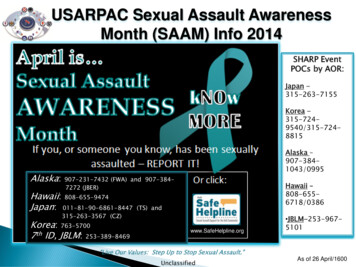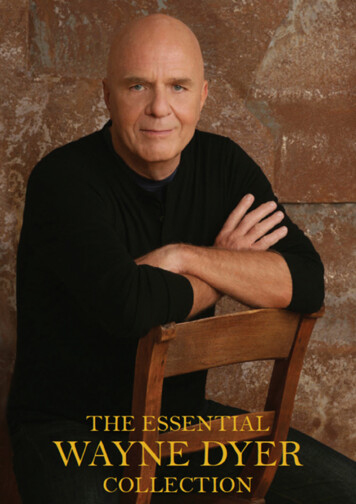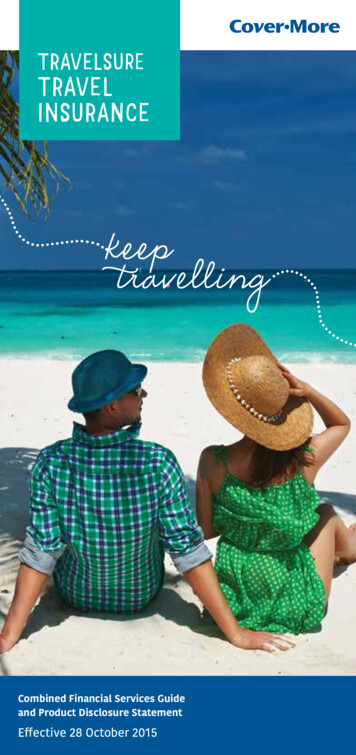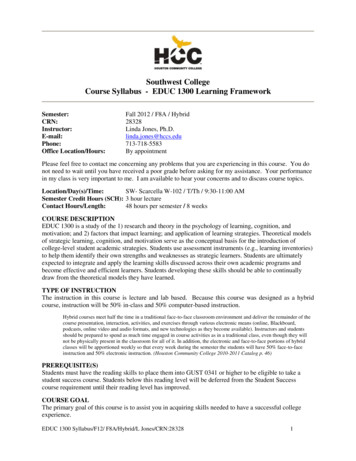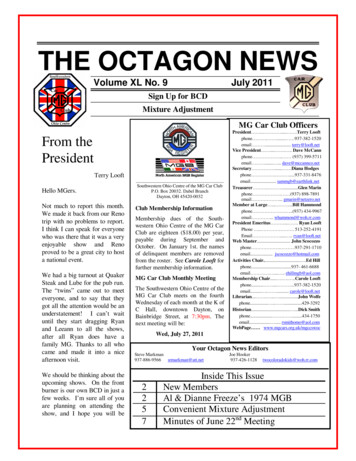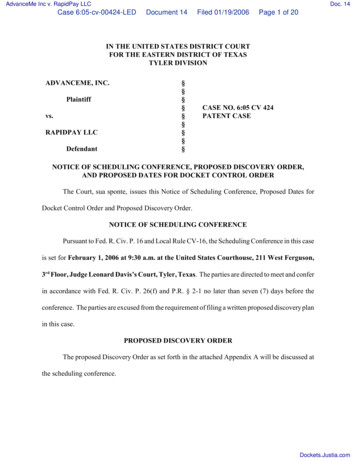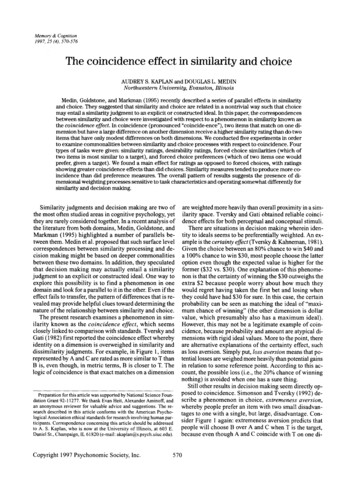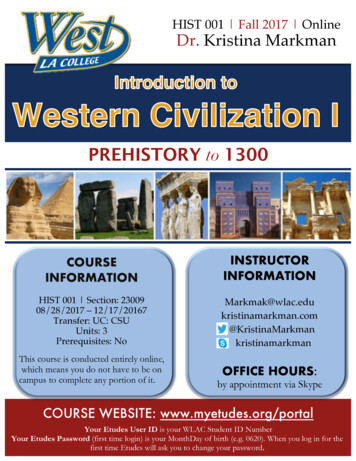
Transcription
HIST 001 Fall 2017 OnlineDr. Kristina MarkmanPREHISTORY to 1300COURSEINFORMATIONINSTRUCTORINFORMATIONHIST 001 Section: 2300908/28/2017 – 12/17/20167Transfer: UC: CSUUnits: 3Prerequisites: mankristinamarkmanThis course is conducted entirely online,which means you do not have to be oncampus to complete any portion of it.OFFICE HOURS:by appointment via SkypeCOURSE WEBSITE: www.myetudes.org/portalYour Etudes User ID is your WLAC Student ID NumberYour Etudes Password (first time login) is your MonthDay of birth (e.g. 0620). When you log in for thefirst time Etudes will ask you to change your password.
COURSE DESCRIPTIONTEXTBOOK REQUIREMENTSWelcome to HIST 001! This course is intended tofamiliarize students with the historian’s craft andintroduce students to the cultures that helped shapethe world in which we live today. Our primary goalsin the course will be to (1) learn how to read andanalyze primary sources, and (2) use primary sourcesto formulate a critical argument about the past.Making of the West (e-book)This course surveys Western Culture from itspre-history roots through the Greek andRoman eras, and Medieval Europe,concluding with the Renaissance andReformation.Special attention will be given to thefollowing TOPICS: the development of cities and urbaninstitutions the role of heroes forms of law and order the development of religious sensibilitiesand ethical systems the development of empire and imperialambitionsVolume 1: To 1750 (fifth edition) by Lynn Hunt et al.(Macmillan Learning Launchpad, nt5e/5781872TEXTBOOK ACCESS (Launchpad)The course textbook is available on Launchpad throughMacmillan HigherEd. There are two ways to gain access to thetextbook. Please note the difference:1. If you purchase the access code through the WLACBookstore, you will receive six-month access to Launchpadand a loose-leaf version of the book.2. If you purchase the access code directly through MacmillanHigherEd, you will only receive six-month access toLaunchpad.TECHNICAL REQUIREMENTComputer:If you do not have access to a computer off campus, there aremany computer labs on campus you can s-Labs.aspxMost public libraries also have computers with internet accessthat you can use for FREE!Software:It is recommended that you compose your written assignmentsin WORD. All WLAC students can download Microsoft Officevia their student e-mail for FREE:https://www.youtube.com/watch?v iDzGoDYY3no&feature youtu.be
STUDENT LEARNING OUTCOMESThis is a process-based learning course that combines independent student engagement with course materials (textbook,videos, worksheets, exams, etc.) and direct instructor supervision of writing assignments. By the end of this course studentswill be able to distinguish between primary and secondary sources, and use the historical method to analyze primarysources and craft a written argument.COURSE OBJECTIVES To familiarize students with the practice of history and the historical method including the principles of cause and effect, continuityand change, perspective, and significance. To help students develop analytical and critical reading skills. To help students develop the ability to frame historical questions, take a stance, and craft a written argument.WHY STUDY HISTORY?Studying history gives us a deeper understanding of the processes that have led to the development of the world in which we live.Learning about the ideas, values, fears, and dreams of the people of the past helps develop historical empathy, promotes intellectualdiscourse, and builds cultural literacy. Understanding the connection between ideas and consequences makes us better-informeddecision-makers and enhances our ability to distinguish the important from the unimportant, to recognize patterns, and to appreciatecultural differences. The study of history prepares us to participate in events of local, state, national, and international significance.History courses in high school teach us to recognize relevant information and make sense of it through summary and explanation.History courses in college teach us to apply information in order to solve a problem. In the process, we learn skills.SKILLS EMPLOYERS WANT(Forbes 2015)SKILLS OF A HISTORIAN Critical thinking and problem solving Collaboration Reading Comprehension Communication: verbal and written Research Data AnalysisWHAT CAN YOU DO WITH A B.A. INHISTORY?ADVANCED DEGREESGraduate School (M.A. & Ph.D.)Law SchoolTeaching CredentialLibrary Science SchoolOther graduate degree Decision making and problem solvingCollaborationCommunication: verbal and writtenPlanning and organizationResearchData AnalysisField-specific knowledgeComputer literacySales and MarketingREADY FOR A CAREER?Jobs to consider: educator, researcher, editor, informationmanager, analyst, archivist, broadcaster, campaign worker,consultant, congressional aide, foreign service officer, intelligenceagent (CIA/FBI/NSA), foundation staffer, information specialist,journalist, legal assistant, lobbyist, personnel manager, publicrelations staffer.Careers for History ory-majors
As this is a distance learning course, student are required to monitor their own learning by keeping upwith the readings and assignments, posting to the discussion board, asking questions, and regularlychecking-in to ETUDES. Students who are unable to participate regularly, regardless of the reason,should withdraw from the class. Students must also complete several graded assignments.COURSE REQUIREMENTS30% ExamsBy Sun. 09/17: Early Humans, Mesopotamia, and EgyptBy Sun. 10/15: Hebrew Civilization, Amarna Egypt, and PersiaBy Sun. 10/29: GreeceBy Sun. 11/12: RomeBy Sun. 11/26: Early Christianity and World of Late AntiquityBy Sun. 12/10: Islam and Medieval Europe30% Primary Source Analysis2 Quote Analysis (5%)5 Primary Source Analysis Paragraphs (25%)20% Participation and DiscussionPrimary and Secondary Identification Quiz (2%)Gilgamesh and Hammurabi Comprehension Quiz (2%)Worksheet: Model Quote Analysis (2%)Judaism Quiz6 discussion posts (12%)10% Museum Attendance & Project(due Friday 12/15)10% Final Paper (due Friday 12/15)ASSIGNMENT GUIDELINESAll exams and written assignments must be completedvia ETUDES by midnight on the due date.Late exams and written assignments will not be acceptedwithout proper documentation (e.g. medical emergency).EXAMSAt the end of every module you will complete an exam. Thereare six exams total. The exams are all open book and consistof 30 multiple choice questions drawn from Launchpadresources (e.g. LearningCurve). There is no time limit, but youwill only have one chance to complete each exam. It is highlyrecommended that you explore Luanchpad resources beforeattempting exams.Please note that the exams are difficult. They are intended toprepare you for upper-division courses. However, this is aprocess-based learning course, so improvement and effort willbe taken into consideration when determining your final grade.PRIMARY SOURCE ANALYSISOne of the primary goals of this course is to teach you toanalyze primary source and craft a coherent written argument.Throughout the course you will be guided step-by-stepthrough the writing process.PARTICIPATIONAt the beginning of the semester, you will complete 4assignments intended to help you improve your studytechniques. Each assignment is worth 2%. You may repeateach assignment as many times as you wish.DISCUSSIONThere are 6 required discussion board posts. Each discussionpost is worth 2% of your overall grade. If your post is original,thoughtful, written in complete sentences, and meets theminimum word requirement (150-200 words), you will receivefull credit. If your post reiterates another student's remarks,seems rushed or incomplete, you will receive partial credit.MUSEUM ATTENDANCE &PROJECTEXTRA CREDIT10% of your grade is based on your attendance of a museumto view their collection of antiquities. Please see instructionsunder “Assignments” tab. I hope this experience will beenjoyable as well as educational. If you are unable to attend amuseum with an appropriate collection, please contact theinstructor for alternative assignment options.10 points extra credit will be offered for eachparagraph revision. All revisions due 12/03.FINAL PAPERThe final paper is an opportunity to practice and demonstrateskills learned throughout the semester.
GRADED ASSIGNMENT CHECKLISTWEEK 2Sunday, Sep. 10 by midnightr Syllabus Quizr Discussion Board: Introductionsr Quiz: Identifying Primary and Secondary Sourcesr Discussion #1: What is history?r Gilgamesh and Hammurabi Comprehension Quizr Quote Analysis #1WEEK 3Sunday, Sep. 17 by midnightr Exam #1: Early Humans, Mesopotamia, and EgyptWEEK 1Sunday, Sep. 3 by midnightWEEK 4Sunday, Sep. 24 by midnightWEEK 5Sunday, Oct. 1 by midnightWEEK 6Sunday, Oct. 8 by midnightWEEK 7Sunday, Oct. 15 by midnightWEEK 8Sunday, Oct. 22 by midnightWEEK 9Sunday, Oct. 29 by midnightWEEK 10Sunday, Nov. 5 by midnightWEEK 11Sunday, Nov. 12 by midnightWEEK 12Sunday, Nov. 19 by midnightWEEK 13Sunday, Nov. 26 by midnightWEEK 14Sunday, Dec. 3 by midnightWEEK 15Sunday, Dec. 10 by midnightFINALSFriday, Dec. 15 by midnightr Discussion #2: Creation Mythsr Worksheet: Model Quote Analysisr Quote Analysis #2r Primary Source Analysis Paragraph #1r Discussion #3: Early Civilizationsr Judaism Quizr Exam #2: Hebrew Civilization, Amarna Egypt, and Persiar Primary Source Analysis Paragraph #2r Primary Source Analysis Paragraph #3r Exam #3: Greecer Primary Source Analysis Paragraph #4r Exam #4: Romer Discussion #4: Why was Christianity popular?r Primary Source Analysis Paragraph #5r Exam #5: Early Christianity and World of Late Antiquityr Discussion #5: Christianity and Islam: Then and Nowr Extra Credit Revisions: Paragraphs 1-5r Discussion #6: The Middle Agesr Exam #6: Islam and Medieval Europer 10% Final Paperr 10% Museum Attendance& ProjectIn accordance with code 9803.28, ACADEMIC DISHONESTY is prohibited and will not be tolerated. Violations of academicintegrity include, but are not limited to: cheating on an exam, plagiarism, working together on an assignment, paper or projectwhen the instructor has specifically stated students should not do so, submitting the same term paper to more than oneinstructor, or allowing another individual to assume one’s identity for the purpose of enhancing one’s grade. Academicdishonesty of any type by a student provides grounds for disciplinary action by the instructor or college. In written work, nomaterial may be copied from another without proper quotation marks, footnotes, or appropriate documentation. Plagiarismwill result in a zero for the assignment, possible dismissal from the class and disciplinary action from the college.
OFFICE HOURSOne-on-one instruction is the best form ofeducation. I will be holding office hours viaSkype. I encourage all of you to make anappointment to discuss your writing and/orstudy methods.STAY POSITIVESome of the course material is very difficult.You should expect to struggle on the examsand writing assignments. However, alwaysremember that your final grade depends onyour improvement and effort to learn.“NETIQUETTE”This semester you will regularly post to aDISCUSSION board. Please remember tomaintain proper net etiquette—netiquette.1. When posting on the discussion board, berespectful of others’ views and opinions.Personal attacks, profanity, vulgarity andcomments that are not productive additionsto the conversation will be deleted and youwill not receive credit for the assignment.2. Think of discussion posts as mini-essays.Write in complete sentences using propergrammar and punctuation.KEEP UPThis course covers a lot of material in a veryshort time. Keeping up with the readings andassignments in essential for success. To makeATTsure that you do not accidently skip a gradedassignment, print out the “Graded AssignmentChecklist” and keep it as reference. Studentswho have not logged-in to ETUDES byMonday, Sep. 4 will be dropped.E-MAIL COMMUNICATIONI will be communicating with the class usingETUDES and campus e-mail systems, so makesure to regularly check your campus e-mail.E-MAIL ETIQUETTEPlease remember that we are communicatingin a formal academic Eenvironment. When emailing me, take the time to properlyaddress, proofread, and sign your letter.QUESTIONSIn online courses it is normal to have manyquestions about assignments, coursematerials, or assessments. Please post yourquestions in the QUESTION FORUMwhich you can access by clicking theDISCUSSIONS tab.REVIEWThe best way to learn is by reviewing yourexams and written assignments. Make sure toalways review my comments on your workand ask questions!
SUPPORT & RESOURCESACCOMMODATIONSWLAC recognizes and welcomes its responsibility to provide anequal educational opportunity to all disabled individuals. TheOffice of Disabled Students Programs and Services (DSP&S) hasbeen established to provide support services for all verifieddisabled students pursuing a college education. DSP&S studentsmay qualify for: priority registration, registration assistance, specialparking permits, sign language interpreters and assistivetechnology (WLAC College Catalog). For more information,please visit Office of Disabled Student Programs and Services(DSP&S), Student Services Building (SSB) 320 (310) 287-4450,http://www.wlac.edu/dsps/index.aspxTECH SUPPORTNeed technical support with ETUDES or your computer? Visitthe Online Student Help Y SERVICESThe WLAC Library provides instruction on how to use the onlinecatalog, periodical, and research databases. In addition to a largecollection of books, periodicals and videos, the WLAC Libraryhas course textbooks which students may use while in the Library.Web access is available in LIRL as well as meeting rooms. Visitthe Heldman Learning Resources Center (HLRC)http://www.wlac.edu/academics/pdf/WLAC Catalog Policies.pdfEMERGENCY PREPAREDNESSThe Sherriff’s Office website includes information about drill oremergency building evacuations, Title IX resources, and what doto in the event of a lock-down or active shooter situation. C3Building, Parking Lot 5, (310) 287-4311 & (310) ORING & WRITING HELPWRITING LAB at WLAC Learning ResourceCenter offers free one-on-one tutoring and help inwriting WritingLab.aspxONLINE WRITING LAB offers free online one-onone tutoring and help in writing papers.http://www.wlac.edu/online/owl.aspTRIO SSS offers free one-on-one tutoring, supportsstudents with the college transfer process, financial aidapplications, writing resume and cover letters, etc. Visit B5100 by Parking lot 35594f06-48ea-934f-7e1c78709400.pdfOnline Education Initiative:Quest for SuccessAs an online student, you have access to the latestresources from California's Online Education Initiative.To get started, go tohttps://ilearn.laccd.edu/enroll/T9CL89 to enroll in theQuest for Online Success . Use your Student ID numberfor the Login/UserID. Your Password is 88mmdd or 88 month date you were born. For example: 880101 for aJan 1 birthday.Keep up with the latest news on distance education at WLAC:http://www.wlac.edu/online/index.asp
Please note that the class schedule is subject to change; changes will be announced and posted to ETUDES.As this is a process-based learning course, you should expect to devote considerable time to reading and rereading sources, reviewing your notes, writing source analyses, and preparing for exams.MODULE 1: BECOMING HUMAN, BECOMING HISTORIANWEEK 1 (August 28–September 3): INTRODUCTION What is history? What does a historian do? Primary and secondary Sources The beginnings of human society to 4000CE What makes civilization?Read and Watchr Watch Kristina’s Welcome Videor Explore Etudes Websiter Explore Launchpad unt5e/5781872r Watch: “How Historians Do History”https://www.youtube.com/watch?v YSrI7pVo4lor Watch: “Thinking Historically”https://www.youtube.com/watch?v mSJLmWnxrPg&feature youtu.ber Review: Kristina’s “What is History?” Powerpointr Read: “The Idea of Western Civilization,” (PDF)r Read: “Prologue: The Beginnings of Human Society” (PDF)– Note the highlighted sections!TB The Making of the WestAssignments (due Sunday, Sep. 3 by midnight)r Syllabus Quizr Discussion Board: Introductionsr Quiz: Identifying Primary and SecondarySources (grade based on completion)r Discussion #1: What is history?
MODULE 2: THE FIRST RIVIER CIVLIZATIONS: Part 1WEEK 2 (September 4–September 10): MESOPOTAMIA From hunting and gathering to new agriculture systems Development of first cities and urban organization First territorial states Development of record keeping, i.e., written culture Law and societyRead and Watchr Read: TB, Chapter 1: “From the Stone Age toMesopotamian Civilization, 400,000-1000 B.C.E.”r Watch: “Mesopotamia Explained”https://www.youtube.com/watch?v RiclXLWQk4kr Watch: Virtual tour of city of Urhttps://vimeo.com/65155846r Read: The Epic of Gilgamesh, pp. 1–9 (PDF)r Read: Code of Hammurabi (PDF)Assignments (due Sunday, Sep. 10 by midnight)r Gilgamesh and Hammurabi ComprehensionQuizr Quote Analysis #1WEEK 3 (September 11–September 17): EGYPT Political structures and royal authority Economics and division of labor Order and justice Death and afterlifeRead and WatchAssignments (due Sunday, Sep. 17 by midnight)r Read: TB, Chapter 1: “Egypt, the First Unified Country”r Watch: “Ancient Egypt Explained”https://www.youtube.com/watch?v jpb4 K7gMzcr Watch: “The pharaoh that wouldn't be forgotten”https://www.youtube.com/watch?v 8bYRy wZEJIr Exam #1: Early Humans, Mesopotamia, andEgypt
MODULE 3: THE FIRST RIVIER CIVLIZATIONS: Part 2WEEK 4 (September 18–September 24): CULTURAL IDENTITY & MYTH HISTORY Creation stories Religion Social responsibility and moralityRead and Watchr Read: “Understanding Cultural Identity, Creation Myths,and Myth History”r Read: "Marduk Creates the World from the Spoils ofBattle"r Read: The Epic of Gilgamesh, pp. 88–95 (PDF)r Watch: Egyptian Creation Myth (Heliopolis Version)https://www.youtube.com/watch?v uTy49JlgJZEAssignments (due Sunday, Sep. 24 by midnight)r Discussion #2: Compare and contrast the creationmyths of Mesopotamia and Egyptr Worksheet: Model Quote Analysisr Quote Analysis #2WEEK 5 (September 25–October 1) THE HERO MYTH: GILGAMESH Hero’s journey Social memory Social responsibility and moralityRead and Watchr Read: The Epic of Gilgamesh (yes! the whole thing!) (pdf)Assignments (due Sunday, Oct. 1 by midnight)r Primary Source Analysis Paragraph #1MODULE 4: THE BIRTH OF MONOTHEISMWEEK 6 (October 2–October 8): HEBREW CIVILIZATION & JUDAISM Nomadic versus settled societies Monaltry versus monotheism Ethics: Religion and behavior Order and justiceReadingsr Read: “Between Two Worlds,” pp. 22–28 (PDF)r Watch: “Judaism 101: Religions in Global History”https://www.youtube.com/watch?v PWsKZ2Xto4Yr Read: Genesis 12–13, 16-17; Exodus 19–21, 25 (PDF)Assignments (due Sunday, Oct. 8 by midnight)r Discussion #3: Early Civilizationsr Judaism Quiz
WEEK 7 (October 9– October 15): AMARNA EGYPT & ACHAEMENID PERSIA Nature of divinity Relationship between human & divine Problem of good and evil Morality, ethics, and social orderReadingsr Review: “Religious and Royal Consolidation underAkhenaten” (PDF)r Watch: “Akhenaten and the Amarna Style”https://vimeo.com/15233973r Read: TB, Chapter 2: “The New Assyrian Empire,” “TheNeo-Babylonian Empire,” & “The Persian Empire”r Watch: The Persian Empire: https://youtu.be/yZlqgtdQoHor Read: Avesta, Zoroastrian Creed (PDF)Assignments (due Sunday, Oct. 15 by midnight)r Exam #2: Hebrew Civilization, AmarnaEgypt, and PersiaMODULE 5: CIVILIZATIONS OF THE MEDITERRANEAN, Part 1WEEK 8 (October 16–October 22): ARCHAIC & EARLY GREECE Minoans, Mycenaeans, and Phoenicians From archaic to early Greece The Polis: Corinth, Sparta, Athens Colonization Tyranny and democracy Gods and mortalsReadingsr Read: TB, Chapter 1: “The Minoans, “The Mycenaeans,”“The Violence End to early Western Civilization”r Read: TB, Chapter 2: “The Reemergence of GreekCivilization,” “The Creation of the Greek City-State,” “NewDirections for the Greek City-State”r Watch: “This is Sparta”https://www.youtube.com/watch?v M7V1a1I5BL0r Read: Homer, Odyssey, Books 9 and 11 (PDF)Assignments (due Sunday, Oct. 22 by midnight)r Primary Source Analysis Paragraph #2r Primary Source Analysis Paragraph #3
WEEK 9 (October 23–October 29): CLASSICAL & HELLENISTIC GREECE Persian Wars Athenian Empire and Peloponnesian War Philosophy, rationalism and empiricism The birth of history Art Alexander the Great and the Hellenic worldReadingsr Read: TB, Chapter 3: The Greek Golden Age, 500-400 B.C.E. (all)r Read TB, Chapter 4: From the Classical to the Hellenistic World, 40030 B.C.E (all)r Watch: “Acropolis of Athens”https://www.youtube.com/watch?v qkSuEmRpjBEr Watch: “Living in Ancient Greece”https://www.youtube.com/watch?v zsOZujLI4X4r Watch: “The Greek Philosopher”https://www.youtube.com/watch?v nFlOl cD2wwr Read: Plato, “The Allegory of the Cave” from The Republic (PDF)Assignments (due Sunday, Oct. 29 by midnight)r Exam #3: GreeceMODULE 6: CIVILIZATIONS OF THE MEDITERRANEAN, Part 2WEEK 10 (October 30–November 5): EARLY ROME & THE ROMAN REPUBLIC Rome: from Kingdom to Republic Military expansion and political consolidation Plebeians, Patricians, and Public Law Roman Family Religion and SocietyReadingsr Read: TB, Chapter 5: The Rise of Rome and Its Republic, 753-44B.C.E (all)r Watch “Ancient Roman Homes of the Rich”https://www.youtube.com/watch?v mCDtk7tWY7wand “Virtual Roman House”https://www.youtube.com/watch?v gDiqKUzSeZMr Watch: “A Glimpse of Teenage Life in Ancient Rome”https://www.youtube.com/watch?v juWYhMoDTN0r Watch: “Four sisters in Ancient Rome”https://www.youtube.com/watch?v RQMgLxVxsrwr Read: Twelve Tables (PDF)Assignments (due Sunday, Nov. 5 by midnight)r Primary Source Analysis Paragraph #4
WEEK 11 (November 6–November 12): IMPERIAL ROME Crisis in the Republic: Revolts, Factions, and Civil War Augustus and Pax Romana Politics and Society in the Early EmpireReadingsr Read, TB, Chapter 6: “From Republic to Empire,” “Politicsand Society in the Early Roman Empire”r Watch: “Rome’s Ancient Monuments”:https://www.youtube.com/watch?v mrU7qAx4w5A and“Ancient Rome Reconstructed”https://www.youtube.com/watch?v cNkR4977468r Read: Virgil, Aeneid, Book 6 (PDF)r Read: The Deeds of the Divine Augustus (PDF)Assignments (due Sunday, Nov. 12 by midnight)r Exam #4: Rome
MODULE 7: THE WORLD OF LATE ANTIQUITYWEEK 12 (November 13–November 19): CHRISTIANITY & THE THIRD CENTURY CRISIS Religion in the Roman Empire Origins and spread of Christianity Crisis of the Third Century and resolution Constantine and the triumph of Christianity Christian community in Imperial RomeReadingsr Read: TB, Chapter 6: “The Emergence of Christianity in theEarly Roman Republic, “From Stability to Crisis in the ThirdCenturyr Read TB, Chapter 7: “From Principate to Dominate in theLate Roman Empire,” “The Official Christianization of theEmpire”r Watch: “Christianity from Judaism to Constantine”:https://www.youtube.com/watch?v TG55ErfdaeYr Read: “Sermon on the Mount” from The Gospel According toMatthew, 5.1-7.29 (PDF)r Read: “The Passion of Perpetua and Felicity” (PDF)Assignments (due Sunday, Nov. 19 by midnight)r Discussion #4: Why was Christianity popular?r Primary Source Analysis Paragraph #5WEEK 13 (November 20–November 26): HEIRS OF ROME: EUROPE & BYZANTIUM The growth of Latin Christendom Reestablishing order and justice in the East A new myth historyReadingsr Read: TB, Chapter 7: “Non-Roman Kingdoms in theWestern Roman Empire,” “The Roman Empire in the East”r Read: TB, Chapter 8: “Byzantium Besieged,” “WesternEurope: A Medley of Kingdoms”r Watch: “Fall of the Roman Empire in the FifteenthCentury”https://www.youtube.com/watch?v 3PszVWZNWVAr Read: Gregory of Tours, “The Conversion of Clovis” (PDF)Assignments (due Sunday, Nov. 26 by midnight)r Exam #5: Early Christianity and World of LateAntiquity
MODULE 8: THE MIDDLE AGESWEEK 14 (November 27–December 3): EUROPE & ISLAM Religious clash and cultural exchangeReadingsr Read: TB, Chapter 8: “Islam: The New Religion and a NewEmpire”r Read: TB, Chapter 10: “The Crusades”r Watch: “Islam 101: Religions in Global History”https://www.youtube.com/watch?v 8S Tw6jA77Er Watch: “The Crusades”https://www.youtube.com/watch?v X0zudTQelzIr Read: Fulcher of Chartres, Chronicle of the First Crusade (PDF)r Read: Ibn al-Athir, Muslim Perspective on First Crusade(PDF)Assignments (due Sunday, Dec. 3 by midnight)r Discussion #5: The Crusadesr Submit revisions of Paragraphs 1-5 via email (10 points extra credit for eachparagraph)WEEK 15 (December 4–December 10): MEDIEVAL EUROPE & ITS LEGACY The Carolingian Empire The emergence of a feudal societyReadingsAssignments (due Sunday, Dec. 10 by midnight)r Read: TB, Chapter 9: “The Carolingian Empire.” “After theCarolingians: The Emergence of Local Rule”r Read: TB, Chapter 11: The Flowering of the Middle Ages (all)r Discussion #6: The Middle Agesr Watch: “25 Myths about the Middle Ages”:r Exam #6: Islam and Medieval Europehttps://www.youtube.com/watch?v eys0UEOqcQ8r Read: Song of Roland (PDF)DUE: Friday, 12/15 by midnight:(1) FINAL PAPER and (2) MUSEUM VISIT & PROJECT
under "Assignments" tab. I hop COURSE REQUIREMENTS 30% Exams By Sun. 09/17: Early Humans, Mesopotamia, and Egypt By Sun. 10/15: Hebrew Civilization, Amarna Egypt, and Persia


